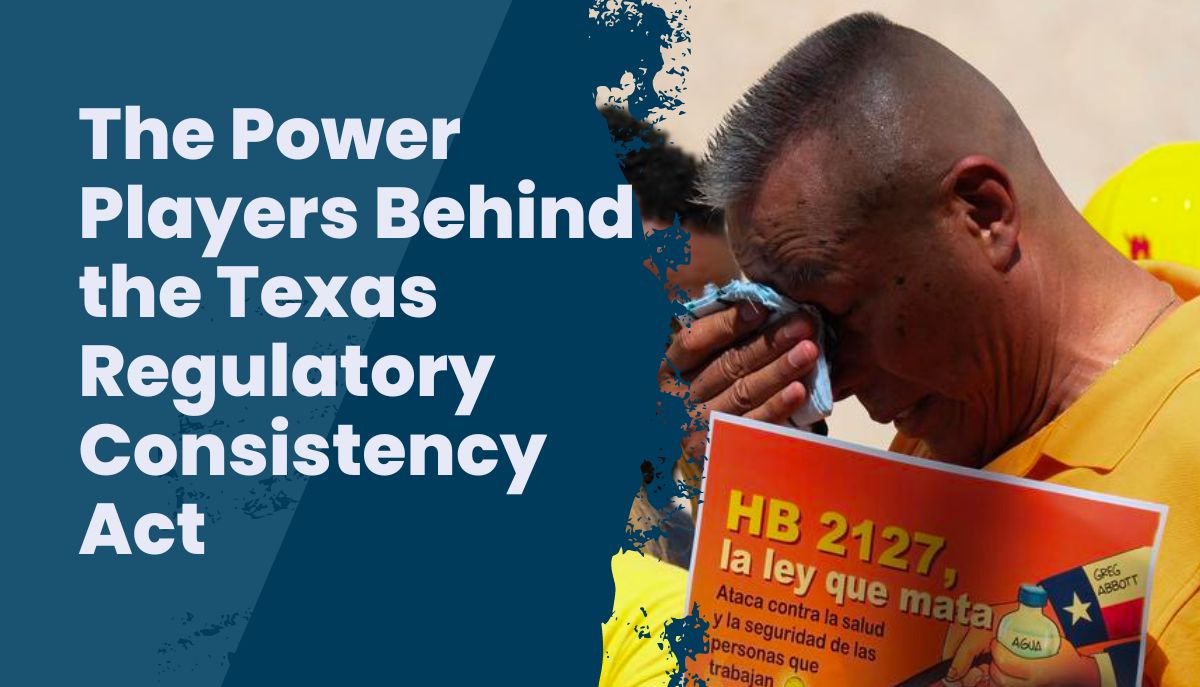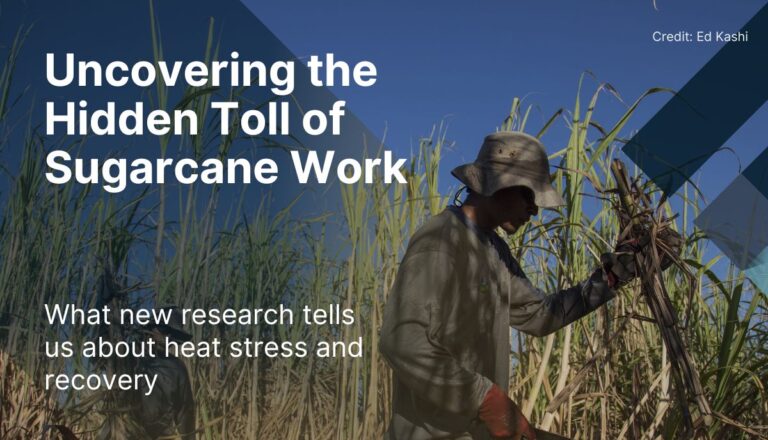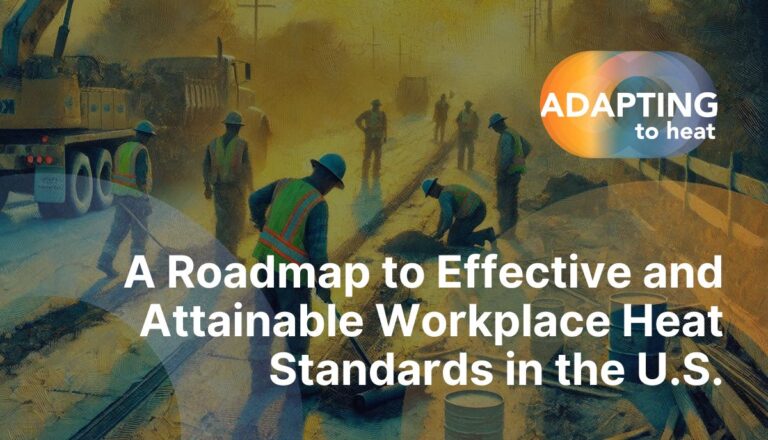At 9 am, Eugene Gates Jr, 66, started his shift as a letter carrier for the United States Post Office in Dallas, Texas.
June 20 was like any other day, except it was scorching hot. On that day, the temperature was already in the 90s in the morning, and the heat index eventually reached a scorching 115 degrees. The extreme heat was caused by a heat wave, unusual in its persistence and intensity.

Later that day, at 4 pm, Gates’ wife received a call. He had collapsed on the job, and had been transported to the hospital, where he later died.
Gates’ story is particularly disheartening because it was completely preventable. The right system in place — one that emphasizes water, rest, shade, and sanitation — would have saved Gates’ life. Unfortunately, Gates is yet another one of the countless workers who have been injured or who have died as a result of heat.
Regulations prioritizing water, rest, and shade for workers are needed now. Some of these regulations currently exist in Texas, in the form of local rules made by cities. Yet, the Texas state government recently passed a bill into law that will eliminate these regulations.
The Texas Regulatory Consistency Act
The Texas Regulatory Consistency Act is a preemption law, meaning it nullifies local rules on the basis that the state government is the supreme regulator of trade and commerce within the state of Texas. It was signed into law by Governor Greg Abbott on June 7, and will take effect on September 1.
Prior to signing the bill, at an event held by the Texas Public Policy Foundation on June 2, Governor Abbott touted the bill as a conservative achievement.
At the event he said, “We did across-the-board regulatory preemption so that local governments — the city of Austin, for example — are not going to be able to micromanage businesses in the state of Texas, especially driving up the costs for local businesses.”
He continued, “We are going to have one regulatory regime across the entire state on massive subject areas that will make the cost of business even lower, the ease of business even better.”
For Governor Abbott, the idea is clear: state government preempts local government. But the implications of the law go well beyond politics. Without making a gesture to protect workers from extreme heat, Governor Abbott is abdicating his responsibility to ensure the health and welfare of Texas, and especially the health and safety of workers on the job. Do business priorities preempt the health and safety of workers?
Campaign Finance & Power Players
The business lobby has played a significant role in the passage of the Texas Regulatory Consistency Act.
Texas House Representative Dustin Burrows — one of the representatives who introduced HB 2127 — has been the recipient of hundreds of thousands of dollars in campaign finance contributions from business lobbies since he first ran for public office in 2015.
Of all the contributions made to him since 2015, the finance, insurance and real estate sector were Burrows’ largest contributors, doling out a total of $217,453 in campaign dollars. General business followed, with $158,694 in contributions. Agriculture and construction interests gave to Representative Burrows, too. They donated $55,235 and $35,750 respectively.
A similar trend is seen in campaign finance information on Senator Brandon Creighton, the other representative who carried HB 2127. Since running for public office in 2002, Creighton has received a little over one million dollars from the finance, insurance and real estate sector. General business gave $679,505 in contributions while construction gave $247,375.
Analyzing campaign finance information further reveals important power players in the issue. Blackridge, a governmental affairs practice representing the interests of businesses, paid Dustin Burrows a total of $21,500, with their biggest contribution during the 2022 election at $15,500. Blackridge’s largest contribution ever — a total of $150,000 — went to Dan Patrick in 2014 for an open election for Lieutenant Governor of Texas. He won the election and has held the position since then.
Dan Patrick’s role as a power player in the issue cannot be overstated. Though contributing a menial amount of money to Burrows and Creighton, the Associated General Contractors of Texas PAC contributed $401,050 in campaign contributions to Patrick, making him the PAC’s largest payee ever.
Merely scratching the surface of campaign finance information points to the close connection that the business lobby has to their allies in politics. Together, they have succeeded in repealing a “patchwork” of regulations and promoting a “one-size-fits all” approach.
The Battle for Regulatory Consistency
The regulatory issue came to a boiling point in 2018, when the City of Austin passed its sick leave ordinance. It required most private employers to allow workers to accrue 64 hours of paid sick leave per year.
On April 24, the Texas Public Policy Foundation filed a lawsuit in Texas court against the city of Austin. They represented a slew of advocacy organizations, including the Texas Association of Business, the National Federation of Independent Business (NFIB) and the American Staffing Association.
In November that year, the 3rd Court of Appeals ruled the ordinance unconstitutional. When the City of Austin appealed to the Texas Supreme Court in 2020, the court declined the petition, affirming the lower court’s decision.
In response to the decision, the general counsel for the Texas Public Policy Foundation said, “Once again, Texas Courts are unanimous in the result that cities in Texas lack the lawful power to mandate paid sick leave that interferes with the ability of employers and employees to negotiate for wages and benefits.” He continued, saying, “Today’s denial by the Texas Supreme Court is a clear signal that cities across Texas should withdraw these unconstitutional ordinances.”
Following the initial decision declaring the ordinance unconstitutional, Texas lawmakers entered the state’s legislative session in 2019 ready to tackle the issue. At an event held by the National Federation of Independent Business — one of the original litigants in the City of Austin case — Governor Greg Abbott announced the filing of the Consistent Employment Regulations Act.
The legislation was sponsored by Sen. Brandon Creighton in the Senate and Rep. Craig Goldman in the House. The companion bills were known as SB 15 in the Senate and HB 1654 in the House.
The business lobby and conservative lawmakers united, reported the Texas Observer, in their common cause to remove patchwork regulations. The bills should have passed, but a last-minute amendment by Creighton removed language protecting local policies that prohibit employment discrimination.
Opponents weighed in, noting that the move would have gutted local LGBTQ protections and put in legal jeopardy nondiscrimination ordinances (NDOs). The business lobby scrambled to assess the effects of the last-minute change, which according to the Texas Observer was a result of Dan Patrick’s influence on the issue and his previously lost battle against a bathroom rule targeted at transgender Texans.
SB 15 effectively died in April 2019. Annie Spilman, the state director for the National Federation of Independent Business in Texas said the bill had been “poisoned” and “clouded with a lot of rhetoric and politics.”

It’s On the Government of Texas
Since then, the NFIB had continued to advocate for the elimination of patchwork regulations, and in 2023 finally won. The results will be harmful. Without adequate protections, workers will suffer from the fatal effects of heat stress as the state grapples with an intense and prolonged heat wave.
To be clear, the Texas Regulatory Consistency Act does not prohibit employers from giving breaks to their workers. They can still choose to protect their workers. But by passing HB 2127, the Government of Texas is taking away local governments’ efforts to protect workers, and without making a commitment itself to protect those workers, the state government is abdicating its responsibility to ensure the welfare of Texans.
Workers who are injured, if they are empowered to report their injuries, will have to file workers’ compensation through the Texas Department of Insurance, which has previously ruled against workers.
The Government of Texas has not shown an interest in addressing heat. One arm of the government, the Texas Department of Criminal Justice (TDCJ), has reported 5 heat-related deaths this year so far, as Texas prisons have been sweltering.
Texas lawmakers did not move to install air conditioning in Texas prisons, despite a $32.7 billion budget surplus.
After the death of a Texas Prisoner, Tommy McCullough, 35, the prison system noted the cause of death as cardiac arrest. In June alone, at least four other prisoners died in hot prisons this month with undetermined causes of death. TDCJ spokesperson Amanda Hernandez said that labeling inmate deaths before the full autopsy was complete would be “inaccurate”, and later announced that the TDCJ now had reason to believe that McCullough was on methamphetamines.
Similar beliefs have been expressed in other cases of heat-related illness. Last summer, when 24-year-old Gabriel Infante was working for B Comm Constructors in San Antonio, Texas, he collapsed. The foreman insisted that Infante’s friend and coworker call the police, believing that his erratic behavior was caused by drugs. When paramedics arrived, the foreman pushed for a drug test. Infante later died.
Now, his mother is suing B Comm Constructors for gross negligence. The lawsuit asserts that the company failed to provide a safe working environment for its employees. According to the lawsuit, B Comm Constructors neglected to implement necessary safety measures, such as regular breaks, shaded areas, and hydration stations. Furthermore, the company failed to provide proper training and protocols for identifying and addressing heatstroke symptoms, the lawsuit alleged.
The evidence is clear. The Texas state government is abdicating its responsibility to keep its citizens safe. Heat is the leading killer nationwide, killing more people than earthquakes, hurricanes and other natural occurrences combined. Despite that, Governor Abbott and his colleagues in state leadership roles are supporting policy and enacting laws that endanger Texas citizens from heat, the killer without a conscience, rather than protecting their constituents.







